11 Big Tech & AI trends from 2023 to better prepare for 2024, Part 1: Holy Gr(ai)l?
February 14, 2024
Introduction
In a short period of time, AI has already become a driver for emerging technologies such as the Internet of Things (IoT) as well as generative AI. This led to tools such as ChatGPT, which broke the record of the fastest-growing user base in 2022 and currently has around 180 million users. As artificial intelligence tools increasingly permeate our daily and professional lives, with businesses incorporating AI into their operations, Data Sciences surveyed Canadians about their feelings towards big tech’s growing influence and the changes that come with it. In the inaugural part of our two-part series on big tech and AI, we present 5 top findings about public sentiment towards major tech companies.
1. Canadians are favourable towards household names in tech, less so towards social media platforms
From concerns of mass layoffs to the implementation of the Online News Act (Bill C-18) in Canada, big tech companies will certainly continue to face ongoing scrutiny in 2024. Public sentiment towards them is mixed. Household names in tech, such as Amazon, Google, Apple and Microsoft, continue to be among the most recognized and well-perceived organizations in the country, above banks and governments. However, social media platforms like Meta, Tiktok, and X (formerly Twitter) find themselves at the other end of the spectrum, alongside Open AI and Chinese tech giant Alibaba.
Our data shows a clear generational divide in how these companies are perceived. Younger Canadians aged 18-34 favour most tech companies, while older respondents tend to hold more negative views toward Meta and TikTok. X (formerly known as Twitter) receives mixed views across age groups: its favourability is somewhat higher among middle-aged individuals while drawing more negative impressions among the youngest (18-34) and oldest (65+) generations.
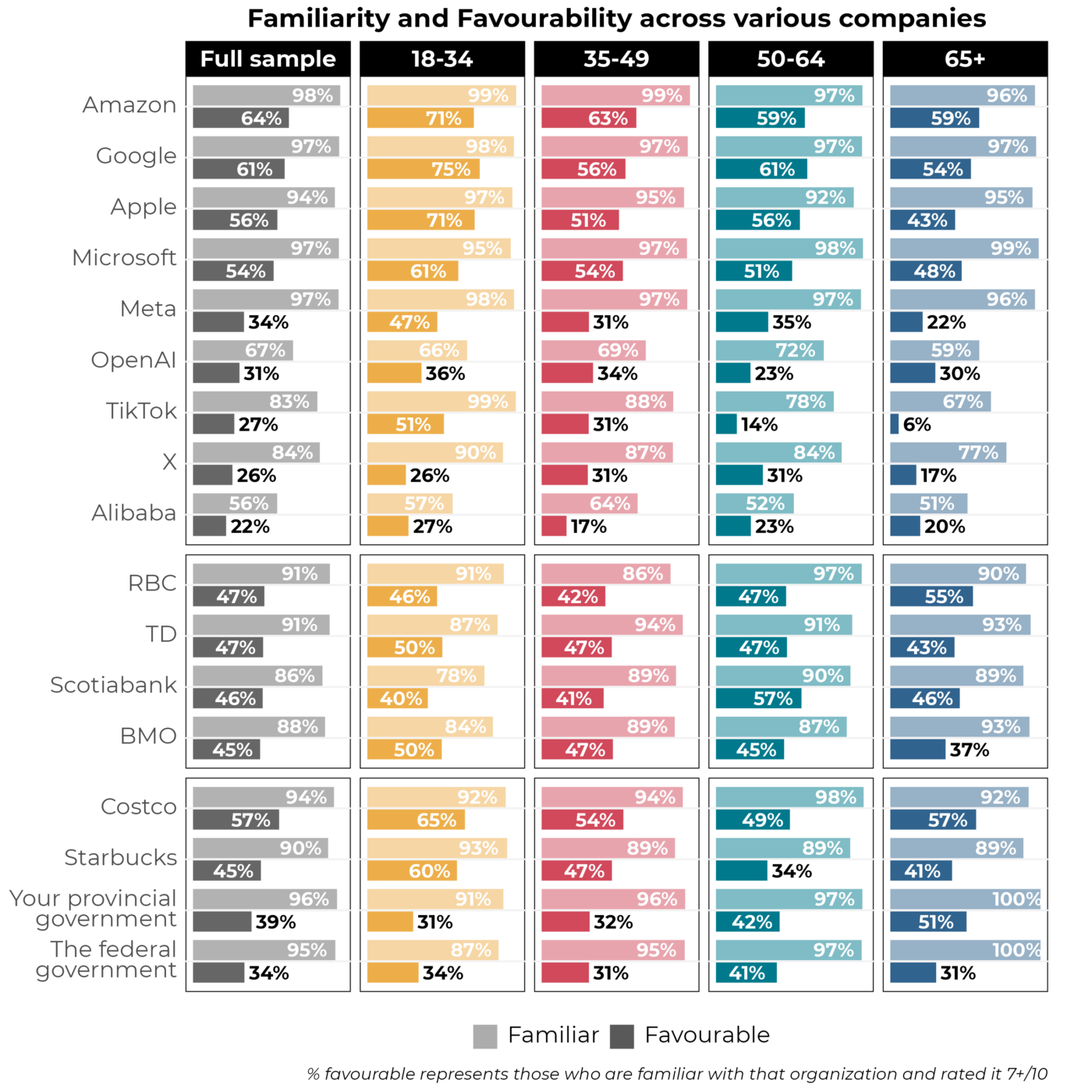
2. Younger Canadians are slightly more trusting of big social media platforms than their older counterparts — but even they are skeptical
A majority of Canadians say they somewhat or completely trust non-social media companies, including Amazon, Apple, Microsoft, and Google, while less than a quarter share the same sentiment for Meta, Alibaba, X, TikTok and OpenAI. Generational disparities, while still present, are somewhat narrower in this context, with older respondents (65+) displaying slightly lower trust towards most of these companies, while younger Canadians (18-34) place notably more faith in Apple, Meta, and Tiktok compared to older respondents.
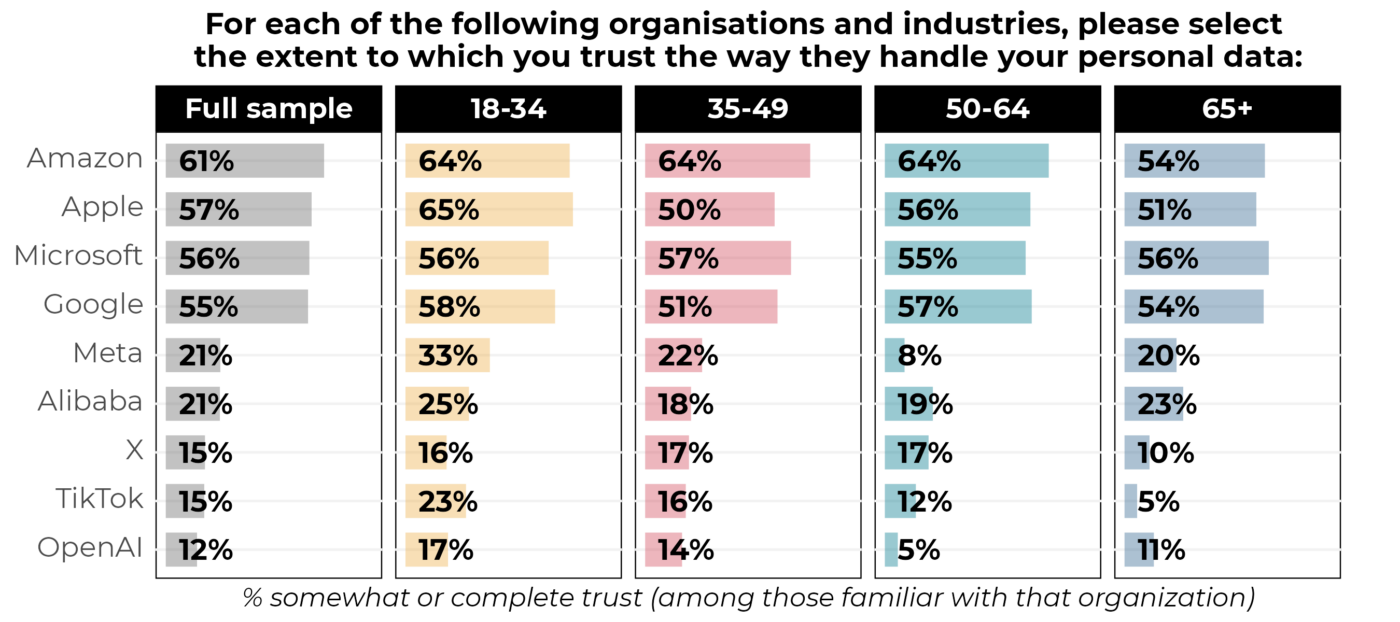
3. A majority think big tech companies are becoming too powerful and should be subjected to regulatory oversight
When we look at big tech companies as a whole, however, our findings suggest there is still a long way ahead for these companies to establish trust within the Canadian public. As of 2023, only 38% of Canadians say they generally trust big tech companies. A significant majority feel these companies are gaining excessive power (75% agree) and should face stronger government regulations (70% agree). This call for government oversight is universal across the spectrum of AI usage. While users of AI exhibit a relatively higher level of trust in big tech companies compared to their non-AI-using counterparts, both groups recognize the growing influence of tech giants, agreeing on the need for increased oversight. Across political affiliations, Liberals tend to advocate for stricter regulations while Conservatives, despite their lack of trust in big tech, are less supportive of such measures.
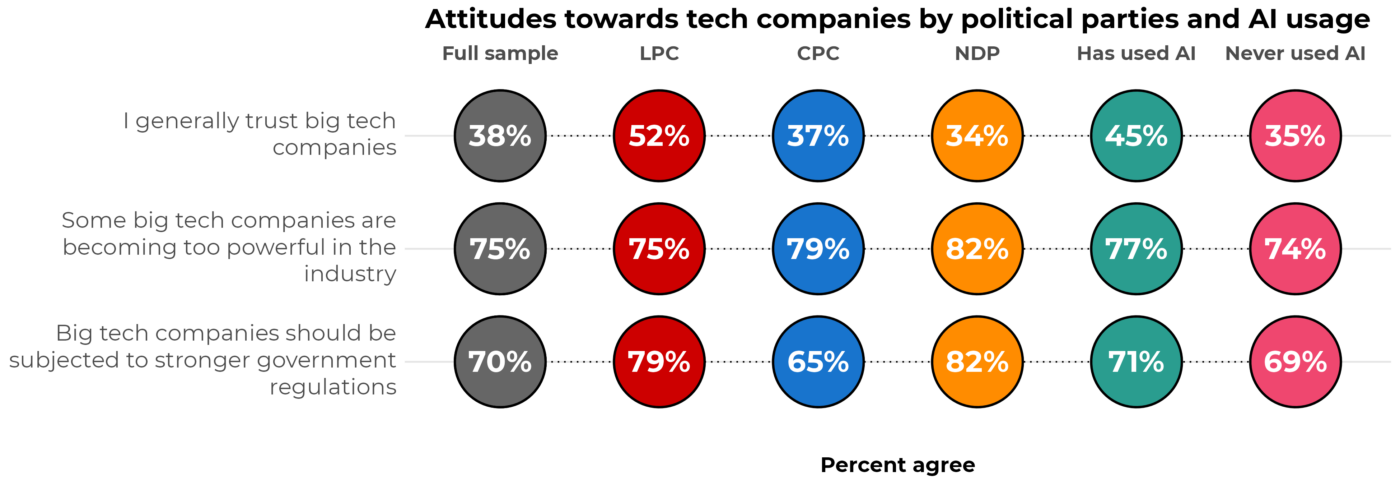
4. Top concerns about big tech relate to accountability, transparency, and lack of competition
Lack of accountability, lack of data transparency, and industry dominance are top reasons why Canadians don’t trust big tech companies. Concerns over tech companies vary across political affiliations. Liberals are concerned about mitigating harmful content (68%) and data transparency (66%). NDP voters share these concerns but are also worried about tax fairness (63%) and privacy ethics (56%). Meanwhile, Conservatives emphasize worries about political influence (56%) as well as freedom of speech (43%).
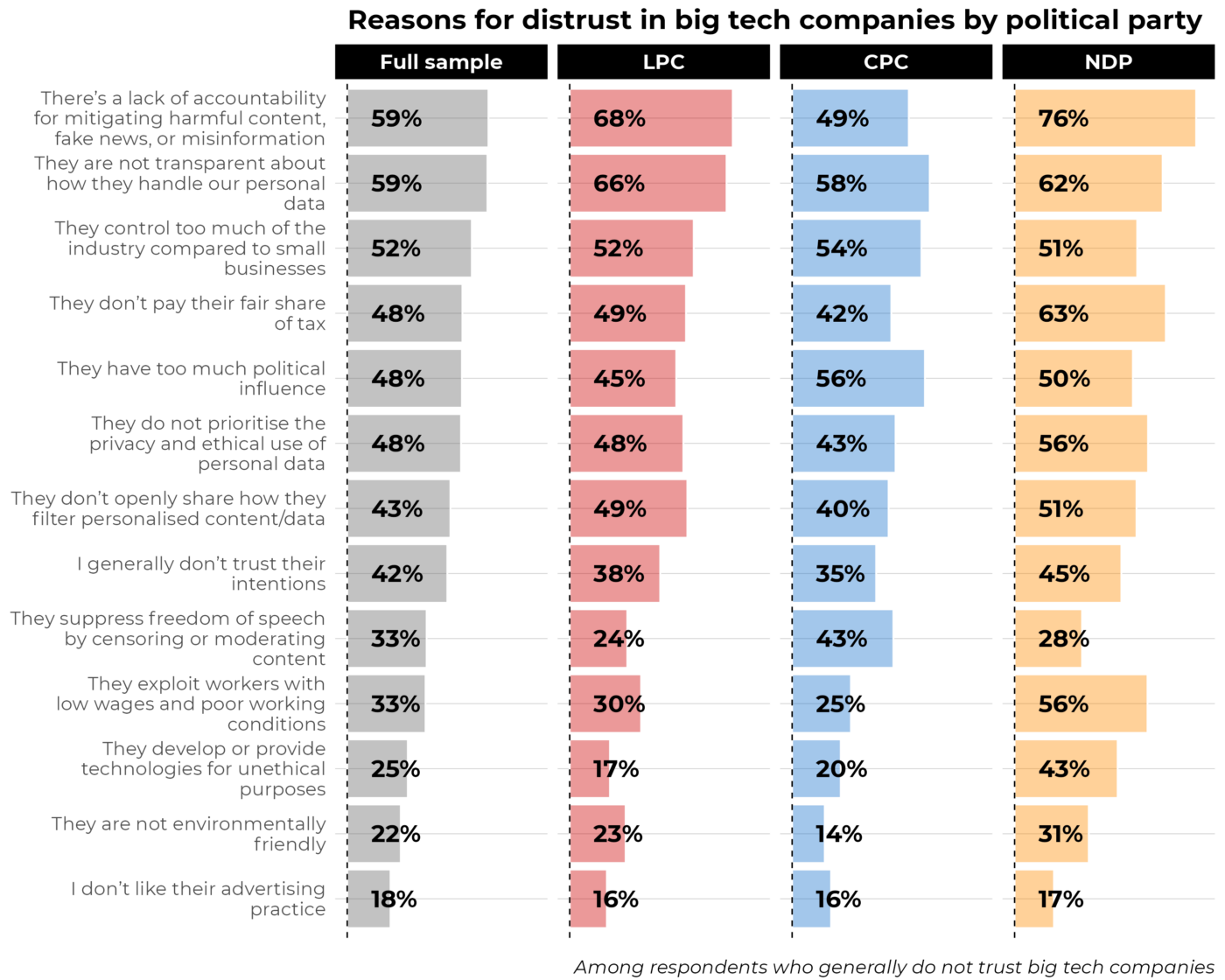
5. Despite concerns, Canadians recognize big tech companies’ positive contributions to the economy and employment
While Canadians generally maintain a degree of skepticism towards big tech companies, many also acknowledge their contributions to certain aspects of society, especially economic and job-related benefits. Liberal voters, in addition, also see merits in big tech companies’ overall contribution to society and their positive impacts on local businesses.
On the other hand, opinions on freedom of speech vary by political affiliation. Liberal and NDP voters tend to perceive big tech companies’ impact on freedom of speech as slightly positive, while Conservative voters tend to hold opposite views.
That said, Canadians across party lines generally agree that these companies pose somewhat of a threat to promoting and enforcing fair elections.
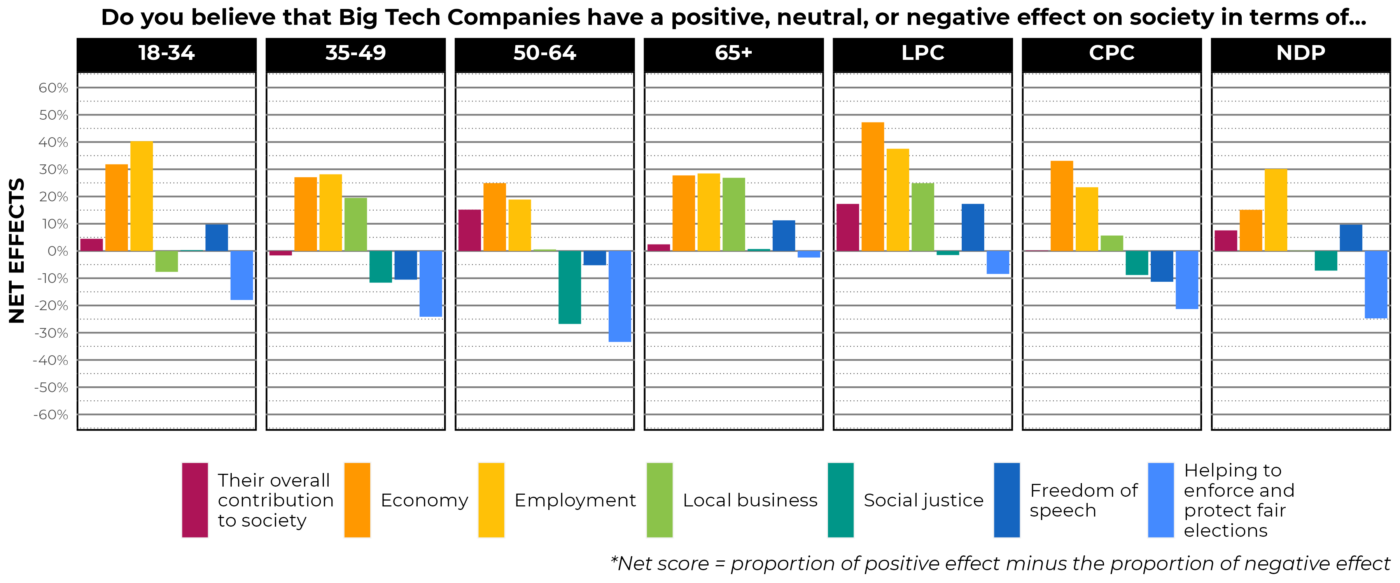
Conclusion: Trust between Canadians and big tech companies remain precarious
In line with global trends, Canadians maintain some level of skepticism towards big tech companies, especially social media giants and foreign tech companies. Much of this distrust arises from the absence of transparency, accountability, and competition. While Canadians do acknowledge big tech companies’ positive economic and employment contributions, many remain vigilant about their potential threats to democracy and individual freedoms. These concerns may have, in some ways, deterred Canadians from widely integrating AI tools into their daily lives.
In Part 2 of our exploration, we will explore the current landscape of AI integration in Canada and delve deeper into the ongoing discourse surrounding the promising opportunities and potential threats associated with AI integrations. Stay tuned for more!
Method
This online survey was conducted from October 10th to October 20th, 2023, among 1,000 Canadians aged 18 or older. Data has been weighted by age, gender, and region so as to be representative of the Canadian adult population. Although online surveys are not associated with margins of error, a probability sample of a similar size would have a margin of error of about ±3%, 19 times out of 20. For any question about this research or our methods, please contact [email protected].



